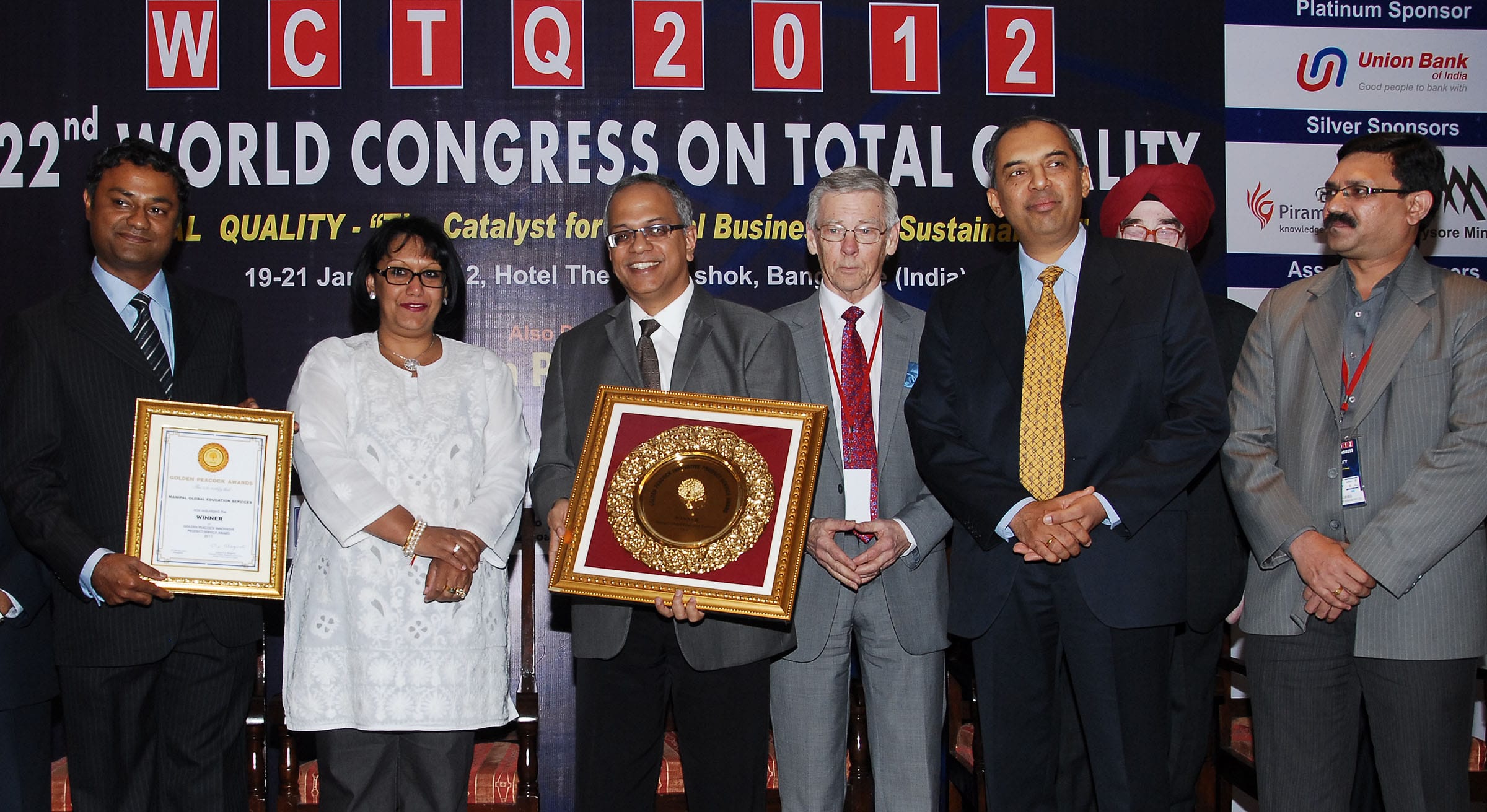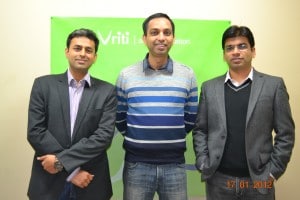 Founded by Alumni of IIT Bombay and Delhi in 2006, Vriti is an assessment driven smart education company, backed by Intel Capital and JAFCO Asia. Swapnil Shrivastav, Founder and Chief Executive Officer, Pankaj Vermani, Co-founder and Chief Strategy Officer and Yogesh Seth, Co-Founder and VP, Products talk to Pragya Gupta about how Vriti is intending to make education smart in India…
Founded by Alumni of IIT Bombay and Delhi in 2006, Vriti is an assessment driven smart education company, backed by Intel Capital and JAFCO Asia. Swapnil Shrivastav, Founder and Chief Executive Officer, Pankaj Vermani, Co-founder and Chief Strategy Officer and Yogesh Seth, Co-Founder and VP, Products talk to Pragya Gupta about how Vriti is intending to make education smart in India…
Please tell us about Vriti?
Vriti has created the world’s first smart education platform that provides a unique market for content providers and students to create/sell & find/buy educational courses respectively. The exchange is powered by patent pending Accelerate recommendation engine which gives a “smart” consumption experience to students. The engine combines test analytics data, student profile and peer community feedback for guiding students to follow an optimal course plan and discover the right content.
You are talking about Smart education. What is smart education and how Vriti makes it smart?
“Smart Education” is a methodology for personalised and adaptive course delivery as per a scheduled plan. It is devoted towards maximising the learning of the students through regular benchmarking with historical and current assessment patterns.
Vriti’s proprietary patent-pending Accelerate recommendation engine helps students plan their study schedule around the course of their choice. Engine constantly assess their performances and based on their current / historical performance data, the algorithm dynamically guides students towards the primary focus areas of improvement and even recommends relevant content in study from. Thus the adaptive algorithm becomes a sort of personal tutor for the student, and it guides him through the entire course plan better than any human intervention would. Prior to consumption, the engine also helps student discover the right content for his/ her calibre by gauging his/her performance against standardised bench marks.
What are the Smart Courses and how does Vriti take them to the market?
Vriti develops ‘smart courses’, which are plan driven programmes with content and testing/assessment modules. The Course plan guides the students throughout the duration of the course via Vriti’s patent-pending adaptive and personalised Accelerate recommendation engine. Vriti courses can be content rich learning modules delivered via pure offline means with online assessments supplements or a combination of digital content bundled with assessments. Pure testing and assessment suites are also available for students who wish to only benchmark themselves against peers and identify their key improvement areas.
The courses delivered through ‘Vriti Smarts’ have been developed by some of the best academicians in the industry for various categories.
We distribute them via business-to-business white labelled systems in schools, coaching houses, institutions, and universities. The courses are created in sync with some of the best authors and biggest brands in the education space and use the power of over a 200 million assessments generated across various exam categories by Vriti’s Education Network.
Our Course Distributors include direct to consumer channels like our website or B2B partners like schools, government universities, publication houses, Vriti Franchisees and coaching Institutes.
With over 200 million questions analysed, more than 920 partners, more than 825,000 questions loaded in the platform, 1 million above discussions, over 1.5 million registered, 3+ million page-views a month (on edu-communities) & students across 121 cities, Vriti’s platform is one of the largest education marketplaces in the world.
Vriti has recently won Deliotte Technology Fast50 Technology 2011 and Red Herring Asia 2011 Awards. Please throw some light on that?
October 2011, we bagged two prestigious awards “Deliotte Technology Fast50 Technology 2011” and “Red Herring Asia 2011”. Vriti has made it to Deloitte Fast 50 for the second consecutive year. Prestigious Awards like these are an endorsement of Vriti’s consistent ongoing efforts to leverage technology for improving quality of education at a very affordable price. Strong fundamentals and consistent focus on value proposition for end student have been the key reasons for the phenomenal and disruptive growth that Vriti has shown over the years.
The Company’s vision for building a Virtual Smart Tutoring for students is finally becoming a reality. We continue to be committed to our cause of taking technology driven education to the last mile. We plan to expand our footprint globally in the coming quarters.
What challenges do you see in the Indian Education Landscape?
How to create recurring revenue opportunity with content is a major challenge. Offering quality education products at a low price point to a wide audience in current Indian infrastructure is also a sizable problem to solve. We are in process of developing the modalities for creating large scale quality content and using mass technology to spread it around.
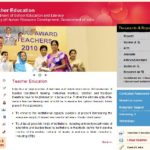 Kapil Sibal, the Union Minister for Human Resource Development has launched a Web Journal – “Voices of Teachers and Teacher Educators”.
Kapil Sibal, the Union Minister for Human Resource Development has launched a Web Journal – “Voices of Teachers and Teacher Educators”.








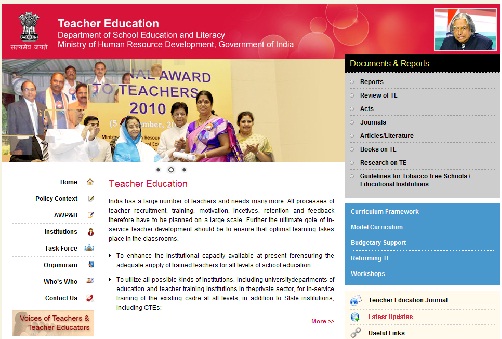

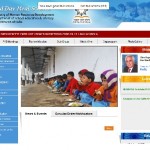 The Union Minister for Human Resource Development Kapil Sibal has launched a comprehensive website www.mdm.nic.in for creating greater awareness about the scheme to ensure transparency in the implementation of the scheme in the presence of Secretary School Education and Literacy, Anshu Vaish and other senior officers. The site provides detailed guidelines about the scheme; the Programme Approval Board approvals for various states/UTs as well as the physical and financial progress under the scheme. In addition, a brochure and a booklet was being launched to bring out the key highlights about the scheme. The site also brings out the innovative practices adopted by the various states. It also provides details about the key officers responsible for the scheme and their contact details.
The Union Minister for Human Resource Development Kapil Sibal has launched a comprehensive website www.mdm.nic.in for creating greater awareness about the scheme to ensure transparency in the implementation of the scheme in the presence of Secretary School Education and Literacy, Anshu Vaish and other senior officers. The site provides detailed guidelines about the scheme; the Programme Approval Board approvals for various states/UTs as well as the physical and financial progress under the scheme. In addition, a brochure and a booklet was being launched to bring out the key highlights about the scheme. The site also brings out the innovative practices adopted by the various states. It also provides details about the key officers responsible for the scheme and their contact details.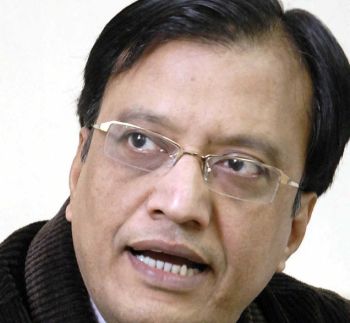
 Prof S S Mantha has been appointed as Chairman of the All India Council for Technical Education (AICTE). He was the acting Chairman of AICTE since August 2009.
Prof S S Mantha has been appointed as Chairman of the All India Council for Technical Education (AICTE). He was the acting Chairman of AICTE since August 2009.